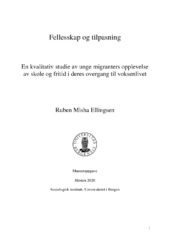| dc.contributor.author | Ellingsen, Ruben Misha | |
| dc.date.accessioned | 2020-10-20T06:35:47Z | |
| dc.date.available | 2020-10-20T06:35:47Z | |
| dc.date.issued | 2020-10-20 | |
| dc.date.submitted | 2020-10-19T22:00:05Z | |
| dc.identifier.uri | https://hdl.handle.net/1956/24155 | |
| dc.description.abstract | Prosjektet har benyttet en fenomenologisk tilnærming som strategi i møte med ett utvalg på 8 personer, som kom til Norge i barne- eller ungdomsårene på humanitære grunnlag eller gjennom familiegjenforening fra land utenfor EU. Prosjektets formål har vært å belyse hvordan ulike tilgjengelige fellesskap og institusjonelle betingelser kan ha en innvirkning på unge migranters tilpasningsmønster i Norge, og hvordan informantene forstår og gir mening til den livsverden de er en del av. Ved å fokusere på den sosiale prosessen i unge migranters vei til voksenlivet, og dynamikken i fellesskapene, som informantene ble sosialisert inn i på veien, har jeg ønsket å gi en betraktningsmåte i forhold til de utfordringene og mulighetene denne gruppen har i samfunnet. Problemstilling: Hvilken betydning har sosiale fellesskap for unge migranters tilpasning i Norge? Prosjektet har brukt en kvalitativ tilnærming, hvor innhenting av data har foregått med 1-1 intervjuer. Informantene var mellom 21-28 år og har gitt et refleksivt blikk på deres opplevelser av små og større fellesskap på veien fra barn til voksen i Norge. For å gi en betraktningsmåte på informantenes historier lener prosjektet seg på Burkitt (2008) og Giddens (1996) sine teoretiske forståelser av selvet, Putnam (2002) sin forståelse av brobyggende og bindende nettverk, og Barth (1969) og Alba (2005) har spilt en rolle i forståelsen av etniske minoritetsfellesskap og grenseprosesser. I intervjuene kom det frem, at sosialt landskap, ulike miljøer, holdninger, alder ved ankomst, nøkkelpersoner, institusjonelle muligheter, hendelser på veien og individets egne strategiske tilnærming, har hatt en betydning for deres videre tilpasningsmønstre i Norge. Informantene blir sådan påvirket av mikrososiologiske faktorer som miljø og hendelser, samt mer makrososiologiske faktorer som kultur og samfunn. Det sosiale landskapet og tilgjengelige sosiale fellesskap, hadde en innvirkning for de personlige og kulturelle ressursene, og mulighetene og begrensningene informantene opplevde i Norge, noe som fikk en betydning for individets oppfatning av seg selv, forståelsen av opplevd tilhørighet og verdiorientering. I sum betydde det at noen fant en trygghet i etniske minoritetsmiljøer, mens andre hadde en større tilknytning i fellesskap med majoriteten. | |
| dc.description.abstract | This project used a phenomenological approach towards a selection of eight people, who came to Norway as children and teenagers for humanitarian reasons, or through family reunification from countries outside the EU. The purpose of the project was to investigate how different accessible social communities and institutional conditions can have an impact on the adaptation pattern of young migrants in Norway, and how the informants understand and give meaning to the society they participate in. By focusing on the social processes in young migrants’ path to adulthood, and the dynamics of the communities into which the informants were socialized along the way, my intentions were to present a way of considering the various challenges and possibilities this group faces in Norwegian society. My research question was “how do social communities influence young migrants’ adaptation in Norway” The project used a qualitative approach, where data were produced in one-on-one interviews. The informants were between 21 and 28 years old and gave reflections on their experiences of small and larger communities on the path from child to adulthood in Norway. In order to provide a perspective on their stories, the project is based on Burkitt (2008) and Giddens’ (1996) theoretical understanding of the ’’Self’’, Putnam’s (2002) understanding of bonding and bridging networks. Barth (1969) and Alba (2005) has played a role in understanding ethnic minority communities and border processes. In the interviews it emerged that social landscapes, different environments, attitudes, age by the time of arrival, structural opportunities, events along the way and the individual’s own strategic approach, have all had an impact on their adaptation patterns in Norway. The informants are influenced by micro sociological factors such as the environment and events, as well as macro sociological factors such as culture and society. The social landscape and accessible social communities had an impact on the personal and cultural resources, and the opportunities and limitations the informants experienced in Norway, which influenced the individual’s perceptions of themselves, their perceived belonging and value orientation. In sum, this meant that some found a sense of security in ethnic minority communities, while others had a greater connection with the majority community. | |
| dc.language.iso | nob | |
| dc.publisher | The University of Bergen | |
| dc.rights | Copyright the Author. All rights reserved | |
| dc.title | Fellesskap og tilpasning - En kvalitativ studie av unge migranters opplevelse av skole og fritid i deres overgang til voksenlivet | |
| dc.type | Master thesis | |
| dc.date.updated | 2020-10-19T22:00:05Z | |
| dc.rights.holder | Copyright the Author. All rights reserved | |
| dc.description.degree | Masteroppgaven | |
| dc.description.localcode | SOS360 | |
| dc.description.localcode | MASV-SOS | |
| dc.subject.nus | 732106 | |
| fs.subjectcode | SOS360 | |
| fs.unitcode | 15-11-0 | |
